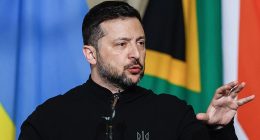The chief of the Russian private military group Wagner, Yevgeny Prigozhin, has claimed his forces have taken complete control of the eastern Ukrainian city of Bakhmut after months of brutal fighting.
“The operation to capture Bakhmut lasted 224 days,” he said in a video posted to Telegram, seeking to claim a final victory in the city.
CNN could not independently verify Prigozhin’s claim, but an initial response from the Ukrainian side disputed it.

Deputy Defence Minister Hanna Maliar, in a Telegram post less than an hour after the Russian mercenary’s claim was published, admitted the situation in Bakhmut was “critical” but said Ukrainian troops were still “holding the defence” in a district on Bakhmut’s western-most edge.
“As of now, our defenders control certain industrial and infrastructure facilities in the area and the private sector,” she said.
Prigozhin added that his forces will hand the control of Bakhmut to the Russian military on May 25.
“Until May 25, we will completely inspect it, create the necessary defence lines and hand it over to the military so that they can continue to work, and we ourselves will go to field camps,” he said.
Wagner also received a message of praise from Russian President Vladimir Putin.

“Vladimir Putin congratulates the Wagner assault detachments, as well as all units of the Russian Armed Forces, which confirmed the presence and closure of the flanks, on the completion of the operation to liberate Artemovsk,” Russian state news agency TASS reported the Kremlin as saying, using the Soviet-Russian name for Bakhmut.
While Russian forces have continued their slow street-by-street advance in the city itself for many months, over the last two weeks Ukrainian forces have managed to recapture small pockets of territory held by Russian troops to the northwest and southwest of the city.
If confirmed, for Russia Bakhmut’s capture would mark the country’s first gain in months, but the city’s symbolism always outweighed its strategic importance.
Read Related Also: All About the Benjamins: A CRT For-Profit Non-Profit Is Unmasked by Project Veritas
Russian forces, bolstered by members of the Wagner mercenary group, have taken heavy losses trying to capture the city.
There are no official casualty figures, but earlier this year a NATO source told CNN they estimated that for every Ukrainian soldier killed defending Bakhmut, Russia lost five.
The battle has also highlighted an extraordinary rift among Russian forces, with Prigozhin at one point accusing a Russian brigade of abandoning its position in the city and railing several times at the Defence Ministry over a lack of ammunition.

Over the early part of 2023, the routes into Bakhmut had gradually come under the control of Russian forces and the battle for the city turned into an inch-by-inch grind, with Ukrainian forces repelling dozens of assaults each day.
Rather than drive directly towards the city centre, Wagner troops sought to encircle the city in a wide arc from the north.
In January they claimed the nearby town of Soledar, and later took a string of villages and hamlets north of Bakhmut, making Ukraine’s defence of the city increasingly perilous.
But even as Moscow’s troops closed in and most residents fled through dangerous evacuation corridors, a small group of Ukrainian civilians remained in the ruined city. Before the war, around 70,000 people lived in Bakhmut. As of March it stood at less than 4,000.
The battle has been likened to the kind of fighting seen in World War I.
Pictures from the area showed soldiers wading through mud with trees mangled by artillery fire.

Thriving city turned into smouldering ruins







